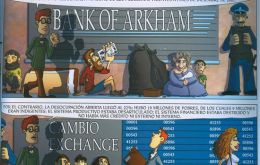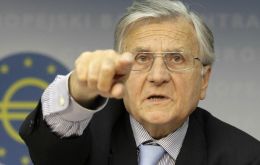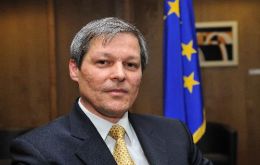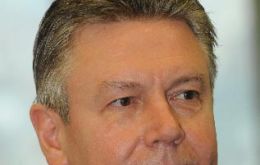MercoPress. South Atlantic News Agency
Economy
-
Saturday, July 10th 2010 - 07:13 UTC
School comic strips to depict the turbulent IMF/Argentina relation

Argentina high school students are enjoying four comic strips, part of the official program, which satirizes the turbulent relation of the country with the IMF, presenting one of the works under the attractive name of “An intruder in the family”.
-
Friday, July 9th 2010 - 05:34 UTC
Euro zone rates unchanged; all eyes set on 23 July EU banks’ stress-tests

The European Central Bank left its key interest rate on hold for the fourteenth consecutive month in July as the region's banks face stress tests to ensure the stability of the financial system that is threatened by investor fears about debt.
-
Friday, July 9th 2010 - 05:29 UTC
UK leaves rates at a record low for the 16th month running

The Bank of England has kept UK interest rates on hold at a record low of 0.5% for the 16th consecutive month. The Bank's Monetary Policy Committee (MPC) also decided on Thursday not to inject any more money into the economy under its policy of quantitative easing (QE).
-
Friday, July 9th 2010 - 04:45 UTC
China confirms it will stick to moderately loose monetary policy

China’s central bank said on Thursday it will stick to a moderately loose monetary policy as economic growth becomes better balanced between consumption, investment and exports.
-
Friday, July 9th 2010 - 01:58 UTC
UK and Irish farmers’ claim Brazil’s beef exports fail to meet EU standards

The UK National Farmers Union, NFU and Irish Farmers' Association have expressed concern about the reopening trade talks with the Mercosur group of South American countries because of the impact it could have on farmers.
-
Friday, July 9th 2010 - 00:17 UTC
European Parliament poises two clear positions in battle for agriculture subsidies

Members of the European Parliament have set out their list of demands regarding the future shape of the EU common agricultural policy (CAP), insisting that EU farm payments should not be reduced.
-
Friday, July 9th 2010 - 00:12 UTC
EU promises support for farmers in event of trade agreement with Mercosur

The European Commission underlined the significance of negotiations for an association and trade agreement with Mercosur and promised EU farmers “accompanying measures” for those sectors most affected, if a deal with the South American block is finally closes.
-
Friday, July 9th 2010 - 00:01 UTC
New document outlines sustainable future for Falkland Islands

The Falkland Islands requires an enhanced foreign investment climate, among many other economic ‘enablers’ in order to achieve a sustainable economic future, according to the newly released Falkland Islands Economic Development Strategy (EDS).
-
Thursday, July 8th 2010 - 01:32 UTC
China rules out ‘nuclear option’ of dumping vast holdings of US Treasury bonds

China ruled out the “nuclear” option of dumping its vast holdings of US Treasury securities but called on Washington to be a responsible guardian of the dollar.
-
Wednesday, July 7th 2010 - 06:50 UTC
Mrs. Kirchner to Beijing to mend trade relations with China

Argentine president Cristina Kirchner will be signing 10 billion US dollars in trade agreements with China during her official visit to the Asian giant scheduled to begin next July 13, according to Foreign Affairs minister Hector Timerman.
